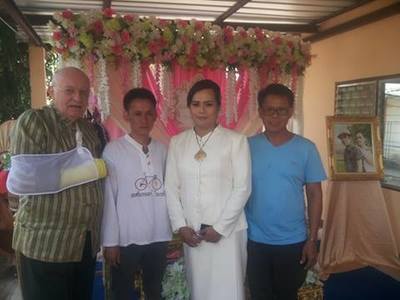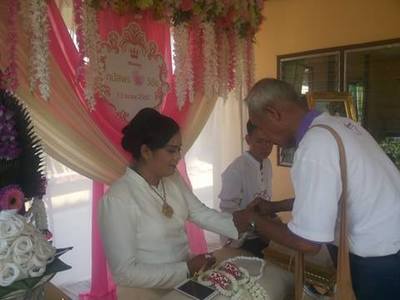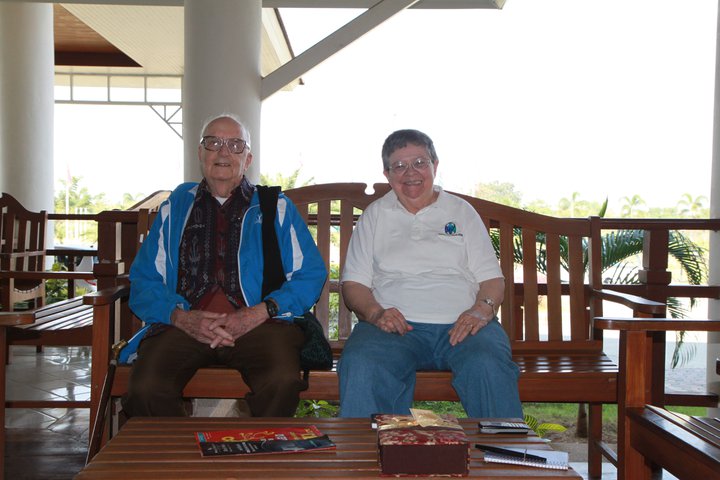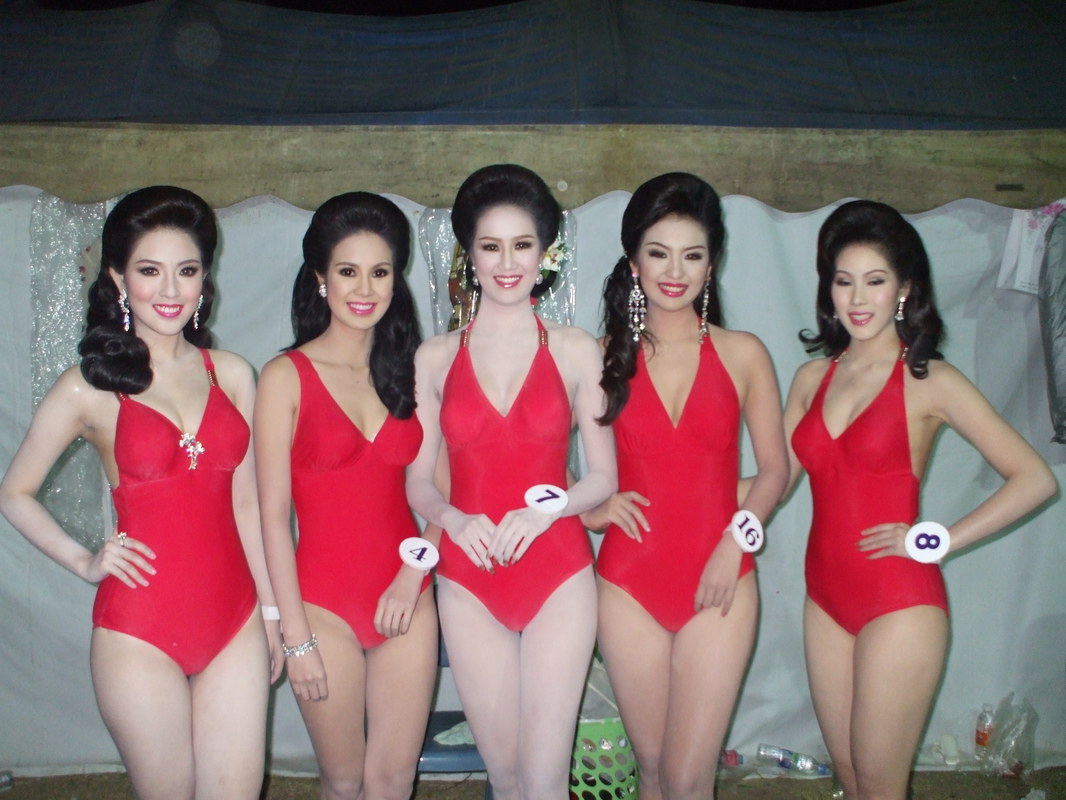|
The third year of very dry conditions here in North Thailand started earlier than last year and looks bad for agriculture. So far water conservation measures have not been announced for people in the city, but farmers have been warned. This drought affects their cash crop production. If the lack of rainfall and water reserves continue into mid-year there will be food shortages, hitting the poorest people hardest, of course. People with money will still be able to buy their way through the shortages. Meanwhile farmers who gambled and planted rice a couple of months ago, are seeing their plants wither, the ground harden and crack, and hopes fade. Fields and streams are dry.
One wonders about national water management in times of drought and floods. No doubt our current national leader’s plans to convert the country from an agricultural economy into an industrial economy have a lot to do with the status of reservoirs and dry irrigation canals. The number of crops that make money for farmers is dwindling. The switch to a money economy is pushing farmers in a number of directions. More and more land is being modified for specialty crops, and away from things to eat locally. Farm size is increasing and machinery use is growing, meaning agricultural employment is decreasing, and being done by non-residents. Farmers either find jobs to earn money or descend into subsistence living with ever fewer system supports – such as dependable irrigation and nearby areas for hunting and scavenging. Most villages will have trouble recruiting people for traditional activities, and housing developments never had such community events. Social change is one generation away, but drought hastens such things. We are still a long way from starvation for anybody, but the drought means hard times. Today we decided to resort to the deep well to water the fruit trees. The well was working the other day, but wouldn’t “hold a prime” today. The most ominous possibility is that the well is dry and there will be no fruit in August and maybe no trees by next year this time.
0 Comments
You wouldn’t have been able to find the wedding unless you asked people. It was off the road, after the road ends, to be honest. No house back there has more than four little rooms. But construction is going on in the village. It takes 3 or 4 years to get a new house finished, made of concrete blocks between concrete poles, with a poured concrete floor. Money comes slowly.
View and Wichai were getting married. The whole village attended, as they do for every wedding-house blessing. It is becoming customary here in our area for the wedding to take place at the same time as the new house blessing. At 9 a.m. a group of 5 Buddhist monks assembled to chant stanzas of scripture invoking merit upon the couple, their family, and everyone present. An elder chanted a more colloquial blessing that mentioned divinities and spirits. This is how almost every new house blessing goes. Then the monks were served lunch, and so was the crowd outside. At noon the monks left and so did most of the crowd. Around four in the afternoon the wedding took place. It consisted of an announcer on a public address system inviting one group after another to come and tie cords around the wrists of the couple while wishing them well. Parents offered the newlyweds floral leis, and the couple pledged affection and respect to the parents in turn. That is what made them married. It was a ceremonial connecting of two clans. Actually the connection can just happen without any ceremony at all. All the people with any relationship to the two families took a turn to tie strings on the couple’s wrists. Closest family members then led the couple into their bedroom and showered them with flower petals. A grandparent might have regaled them with a few words of advice, full of double meanings. Meanwhile, the party began. The crowd came back for more food, plenty to drink, honorary messages, and scantily dressed singers filling the air with familiar tunes. The only thing that set this wedding apart from every other wedding in villages around here is the fact that the bride is a transsexual. She was born and treated as a boy for a few years. But she has become a full-fledged woman. How she accomplished that seems to be irrelevant. We cannot be sure whether there was any surgery involved or whether the district office has changed her national identification card from M to F. What we can see clearly is that Wichai presents himself as a short, muscular, tattooed, shy, farmer who does wood carving on the side. The village reacted to this couple as they would to any couple. This type of couple is not unheard of out here. Almost everybody can name one or two couples with a trans wife and a “real male” husband (to use the term most common). There are lesbian couples here, too. I know of several two-male marriages, but Pramote and I are the only ones with any kind of official status [we were married in the USA]. The Thai government is lagging behind village folks. Progress toward equality for persons of diverse sexuality still has a ways to go. Job discrimination is mentioned frequently. Legal right to adopt and raise children is still a dream. View and Chai cannot have their marriage registered and get an official marriage certificate unless View’s ID card calls her female. But village people have little sense that this couple’s relationship is more unusual than several others in the village. Every relationship is different. It’s in the city where life gets confused. Konrad Kingshill and Carolyn Ryberg Kingshill have made a lasting impact on perhaps more people than any missionary couple of modern times in Thailand. I want to take a few moments to show my
appreciation, in behalf of many. Konrad was a refugee from Nazi Germany who fled to America via England, in order to go to college. He graduated from Hastings College in Nebraska with a triple major in math, chemistry and physics. After a couple of years teaching in a junior college in the USA he agreed to come to Thailand in 1947, even though he did not know where it was. His job was to teach math, physics and chemistry in Christian College of Thailand, which did not yet exist – and was not permitted by the Thai government for more than a quarter of a century. In other words, Konrad was not one to be thwarted by impediments. In the interim, so to speak, he accomplished a daunting amount: he mastered Thai language, did anthropological research on Northern Thai village life resulting in a break-through study that was the standard on the topic for 50 years, acquired a PhD from Cornell University, and married Carolyn Ryberg who was a student of music at MacMurray College in Jacksonville, Illinois – whom he chanced to meet through Dr. Ralph Robbins, a relative and fellow refugee, who taught music at Mac. The interim continued. Konrad and Carolyn were a formidable presence wherever they lived. In Chiang Mai they helped establish a school for missionary children, recruited the daughter of the British Consul General to be the first teacher and acquired one of the historic mission residences for the school. It is now the famous Chiang Mai International School, the first such school outside of Bangkok. Meanwhile, Konrad turned The Prince Royal’s College into the premiere private school in town, and the finest school of its type in the country at the time, by helping it transform by adding a co-educational secondary division, another national first. In Bangkok, Konrad rescued another faltering boy’s school and helped it build a new campus facility and continue as the school of choice for Bangkok elite, but with scholarship provisions for the non-elite. Bangkok Christian College is one of the best-known primary and secondary schools in the country. Since the Thai government was still not ready to let private institutions of higher education be established, Konrad was invited to work his magic on the other 22 schools of the Protestant Church of Christ in Thailand. To do that, he was installed as head of all of them. His job was to pry them out of the grip of certain leaders, to insist on educational quality controls unequivocally, and to make sure new leaders were made ready when their time came, and that every program was excellent. In the city of Nan, where Konrad and Carolyn lived for a while, two schools had to be merged to form a new one. I venture that if Konrad had not succeeded, not only would most of those 22 schools have closed, but another 20 Christian schools would not have been founded in the wake of their success. The Thai government sent groups to study and copy these “best practices”. Carolyn was by no means hidden behind Konrad’s shadow. Her legacy today might be said to be the revolutionizing of the music of the CCT. It is hard to exaggerate how “undeveloped” church music was in 1950, even though hymn singing is the life-blood of Christian worship and evangelism. Everywhere she went Carolyn established choirs, gave piano lessons and made sure music was taught in schools, which fed into church music. One prominent Christian university president credits her days singing in Carolyn’s school chorus in Nan with her conversion to Christianity – and those like her are in the hundreds –completely without aggressive evangelism that had become fashionable. Finally, the Thai government yielded, allowing private institutions of higher education to be chartered. Konrad was recruited to assist CCT leaders in fulfilling the government’s ever-expanding requirements. It became obvious that “people in Bangkok” would have been relieved if the CCT had given up, but Konrad was not easily diverted. Whatever new challenge or delay they threw in the way, he persisted. In 1974 Payap College was granted a charter. The college had a thrown-together feel, being located on two campuses, miles apart, in facilities built for other purposes. Carolyn became a music teacher in the Humanities Faculty, which expanded by incorporating the theological seminary’s Department of Church Music. Before long, she was head of her own Music Department and astutely recruited students as well as faculty members including missionaries and outsiders like talented, eccentric Bruce Gaston. Today the College of Music is one of Payap’s banner colleges, consistently attracting more applicants than can be accommodated. I feel that improvement of the quality of church music is one of the most remarkable changes in the Thai church in the last five decades, thanks to Carolyn and the new generation she encouraged, as well as availability of affordable keyboard instruments. For her accomplishments, her alma mater, MacMurray College, granted her an honorary Doctor of Music degree a few years ago. As Payap grew Konrad continued to help in the expansion. A new campus was the most urgent need, but that was an immense undertaking. A breakthrough came when the college was offered 4 acres of land near the Mae Kao River, outside the city. Working with a team, other land was bought using bank loans. The second break came when Konrad was told by a US Congressman of grants being made for American Schools and Hospitals Abroad, almost all of them in Israel up to that point. The first ASHA grant covered the costs of 4 buildings and campus infrastructure; more grants followed. Konrad’s attention to details was legendary, assuring sustainability and protection for Payap. The college expanded into enrollments in the thousands with stunning new brick buildings and covered walkways. In my opinion, Konrad’s most significant contribution to the well-being of thousands of personnel in the CCT was almost an after-thought (as it seemed at the time). He engineered a retirement program for all CCT employees working in schools, hospitals and churches. This was a key to realistic welfare for teachers and pastors that encouraged candidates to work in these programs. Again, the government has copied Konrad’s plan. When retirement time came, Konrad and Carolyn established residence in Pilgrim Place, a retirement community in Claremont, California. Konrad said that he had to be out of easy reach if Payap was to move forward without deferring to his status as a founder and patron. He was honored with an Honorary Professorship by the Payap Board of Trustees. Carolyn moved out of Chiang Mai and away from the Music Department, but filled in a few years until her own retirement as a missionary in residence in Pahk 8, southwest of Bangkok. Konrad was honored again by having an assembly hall in the International College Building named for him. Carolyn is honored by having the main concert room of the College of Music named the CRK Recital Hall. She said future students would be relieved not to have to remember a long name of someone they never knew. In February 2014, Payap University invited Konrad and Carolyn to come back to participate in the 40th anniversary celebrations. [See the picture of KK and CRK on the porch of Paradonparp International House at that time] The first night back in Thailand, Konrad fell in the bathroom and never fully recovered. He died on February 28, 2017 in Pilgrim Place. Carolyn is staying in Pilgrim Place near family and many retired missionary colleagues. Here’s a little test:
What public restroom would you advise these beauty contestants to use? [Take your time, they aren’t right here needing your advice in a hurry, although most of these questions in real-life are rather urgent.] Let’s limit this exercise to a few choices: 1. If they go as a group should they use the one labeled MEN or WOMEN or HANDICAPPED? Those are the three available. 2. Should THEY be the ones to choose or should some outside authority decide for them? 3. Does it matter whether or not violence or verbal abuse might result? There are levels of consideration, aren’t there? But just to make this reasonable, I’ll let you know what I know about these beauties. They are competing in a transgender beauty contest. We do not know many other things about their physical anatomies, their gender orientation, or their presentation on a daily basis. We do not know their names – they use numbers for the contest. We know nothing about them except what they look like at the moment, and where they are. We hardly ever do know more than that about people we encounter in a restroom. Here in Thailand if a person looking like that entered a men’s restroom everyone would assume she was trans, originally a boy. If she went into a women’s restroom the assumption would also be she belonged there. Either way there would be no fuss. If, for instance, I wandered into a women’s restroom I would probably be gently led to one across the hall. It would be assumed I was confused, because I “present” as a male, a rather old, benign, foreigner – the type likely to be befuddled. On the whole, people use the restroom that conforms to their outward appearance. If one prefers to appear ambiguous, one gets the benefit of the doubt. Location of the restroom might make a difference. But most schools and malls operate on the principle that you use the restroom you are dressed for. Anyhow you get to decide. How about that? |
AuthorRev. Dr. Kenneth Dobson posts his weekly reflections on this blog. Archives
March 2024
Categories |
| Ken Dobson's Queer Ruminations from Thailand |
|




 RSS Feed
RSS Feed
